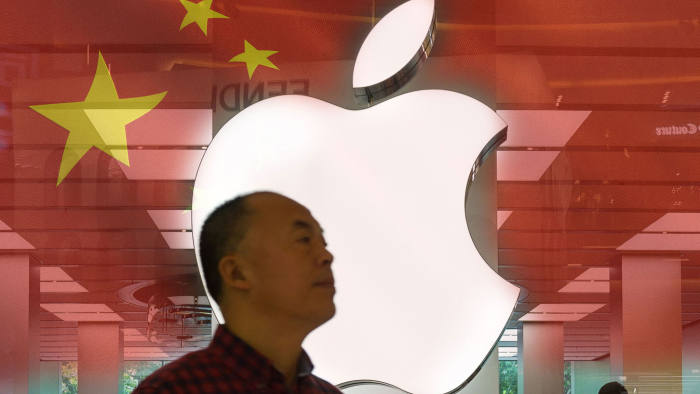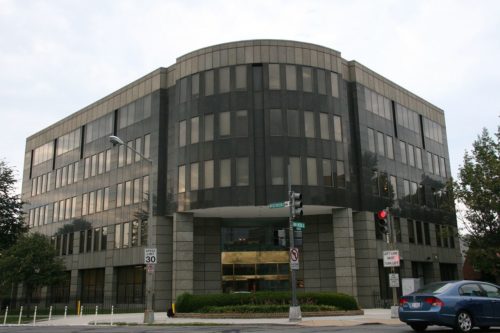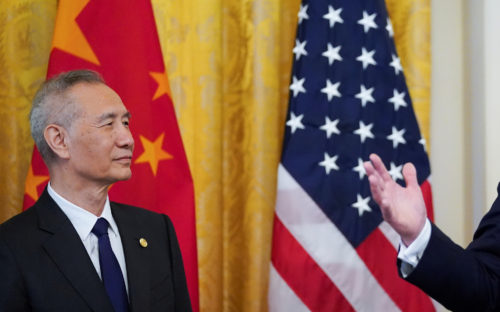Trade war, day 33: China threatens Apple could be ‘bargaining chip’


In our report for The China Project Access members on day 32 of the trade war (paywall), we noted that Chinese state media appears to be becoming less restrained in its rhetoric on the trade war.
Today, the People’s Daily republished an op-ed that singles out Apple — which recently became the first company to hit a $1 trillion market cap, in large part thanks to strong sales in China — as a potential “target of anger and nationalist sentiment” in the event of continued trade tensions.
- Early in the trade war, China established a strategy for dealing with the U.S. that shied away from the mass consumer boycotts that Beijing has incited against South Korea, Japan, and many other countries in past disputes of various kinds.
- The People’s Daily op-ed could signal a break from that reluctance to threaten boycotts — though a variety of unspecified, non-tariff retaliations to the Trump administration’s tariffs have been threatened for months.
- The op-ed was first published in the Global Times on August 2, CNBC notes, though as The China Project has pointed out, the Global Times is a mass-market subsidiary of the People’s Daily, and contains significantly less authority in speaking for Beijing than the People’s Daily itself.
- The headline of the article in both publications reads, “Strong sales of US brands including Apple give China bargaining chips in trade row.”
Speaking of “anger and nationalist sentiment,” two helpful pieces analyze just that in relation to the trade dispute on both sides of the Pacific:
- Trump is following Republican Party voters on China trade policy, not the other way around, three researchers argue in the Washington Post.
- Using data from 2005-2010, the researchers show that the amount of economic “shock” that various constituencies felt from trade with China corresponded to more negative language about China from representatives, but not public support of tougher trade policies, as had previously been suggested.
- “Scapegoating China for the negative externalities of trade was convenient and let Republican legislators respond to voter concerns while continuing to support their party’s position on free trade,” the researchers conclude. Trump was simply the first to take advantage of the economic nationalist sentiment against China that Republican voters had been conditioned to feel for many years, because he appears to be the first Republican leader to actually want to trade less with China.
- In China, there are no similar numbers to analyze, but that doesn’t mean smart writers can’t get a sense for how the trade war is perceived both high and low in the country. Brook Larmer writes for the New York Times magazine (paywall) on the attraction of a historical view, of China’s centuries-old humiliation at the hands of Western powers, and that Trump’s trade war is “yet another Western attempt to contain China and prevent its rise as a superpower.”
- President Xi Jinping has “staked his legitimacy on restoring China’s greatness” pre-humiliation-by-Westerners, leading observers such as James L. McGregor, chairman of the greater China region for the consulting firm APCO Worldwide, to predict, “If it comes down to a war of attrition, China will win… At the end of the day, we may end up making China great again.” Soon after Donald Trump’s inauguration, McGregor warned that Donald Trump “should know that he is about to be seriously outsmarted by a country that has been spectacularly outmaneuvering American policymakers and businesses for at least a decade.”
Meanwhile, several aspects of U.S.-China business continue to roll along as normal:
- Soybean shipments are on their way from the U.S. West Coast to Shanghai, after a three-week pause, Bloomberg reports (paywall).
- Tesla is “looking to fill 14 roles, including architectural designer and senior finance manager for its Shanghai Gigafactory,” according to Reuters.
Previously in The China Project’s trade war coverage:






